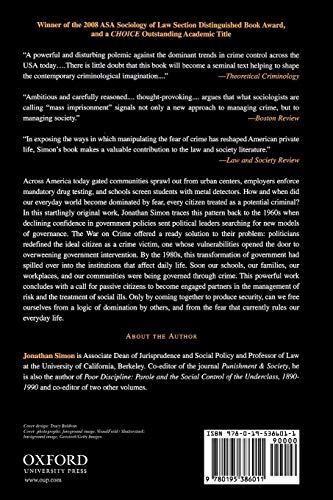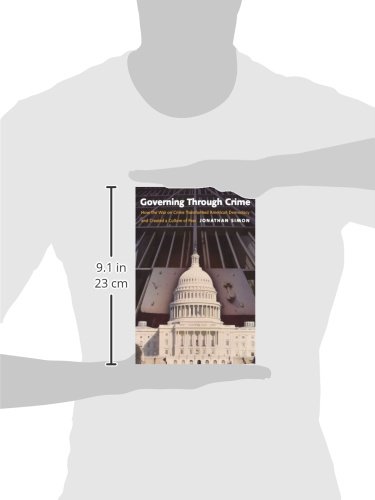Deliver to DESERTCART.MA
IFor best experience Get the App




Full description not available
V**S
Professor J Simon is Cal Bear with a big heart
Criminal Justice system is scary, screwed up and tilted to favor the rich. J Simon goes in depth into the systemic issues plaquing our criminal Justice in USA. Definitely a must read. And he has more out already and probably a few more to come … stay tuned …
S**N
Imaginative interpretation of the most recent phase of US history
I've read plenty of books that deal with questions of the growth of mass incarceration and surveillance in US society, the 'culture of fear' paranoia that defines much of our popular political culture, etc. and so I thought this book would mainly cover familiar material. But I was wrong. Jonathan Simon offers a fresh interpretation of these developments. Central to the development of 'governing through crime' is the emergence of the crime victim as the central figure around which political debate revolves, and the identification of supporting police/prisons/death penalty with solidarity with that victim. Simon shows how this has raised the profile (and political power) of prosecutors and governors (most of our presidents recently, in part because of their ability to wield the death penalty). On the other hand, this development has thrown the judiciary on the defensive, as it is perceived as an obstacle to victim's righteous vengeance through their representatives, the police. Simon also deals with the way crime has defined the governance of families, schools, and, perhaps most originally, workplaces. In the latter, as unions have collapsed, charges of the crime of discrimination have become one of the few recourses workers have against employer power. At the same time, employers treat workers as potentially dangerous criminals who may be responsible for violence in the workplace. Simon ends by tying the logic and limits of governing through crime to the failings of the US in stopping, and later reacting to, the attacks of 9-11.Simon does not have much to say about the economic changes that have accompanied and been intertwined with the practice of governing through crime. For that you should read Christian Parenti's Lockdown America or Ruth Wilson Gilmore's Golden Gulag. Nevertheless, this book should also definitely be on your reading list to understand this disturbing trend.
G**.
Compelling Approach to Understanding US Political Culture
The US Constitution puts restraints on government. To legitimate the vigorous exercise of political power, leaders must claim to serve the interest of some large segment of American citizens--yeoman farmers, industrial workers, Disadvantaged minorities, or, since the Nixon administration, potential victims of crime. This claim in turn structures how social problems are perceived and addressed. The current obsession with crime has encouraged courts to disregard constitutional guarantees such as habeas corpus and due process. The impact the current obsession with crime has on family life is even more disturbing. Simon's work is conceptually powerful and well documented.
F**G
A Reading Requirement for A History Class
To the author's credit, he admits the book's thesis is polemic and perhaps overstated. While I would recommend to all who read this book, to do so with a critical eye, the author does make some interesting observations. Unfortunately, his voice is so strong that he becomes a distraction. While reading the book was was continually interrupted by mental protests to many of the author conclusions. This however, may serve to prove one of the the author's points, the zero-sum mentality he refers to regarding victims rights.
P**K
calling all crim people
If you are interested in criminology/criminal justice then go get this book.
W**Z
Excelente libro
Como nuevo y casi regalado
K**N
Boring!
We used this in a Criminal class and I just about died at how stinkin boring of a read this is! Phew, glad that one is over.
E**R
a brilliant analysis
How is it that the American state continues to grow in a politically conservative age? Professor Simon argues that the growth of federal crime control policy is the key to understanding this phenomenon. Beginning in the 1960s, and continuing through to century's end, the willingness of national politicians to assume responsibility for crime fighting and the establishment of social order has allowed the federal government to grow, even after Americans grew to doubt the ability of Washington D.C. to solve social and economic problems in the wake of the Great Society. Conservative Chief Executives promised to use the powers of the federal government to stop crime and social disorder and to secure Americans from all manner of threats to life and property. The fact that crime was in fact rising in the 1960s and 1970s gave the crime issue the needed salience to make crime control a seemingly legitimate policy goal for Washington D.C.Professor Simon excavates how the image and substance of crime fighting proved to be manna for the continued aggrandizement of executive power in the American federal state. Also, conservative politicians in both parties worked in the legislative branch to delegate powers in crime fighting to the President, as well as governors, mayors and district attorneys at the state and local level. For Simon, the Omnibus Crime Control and Safe Streets Act of 1968 was the key legislative template for this process; thus, that act ranks right up with the Civil Rights Act of 1964 and the Voting Rights Act of 1965 as one of the most important laws of the decade, though most Americans have never heard of it.Simon covers this process in the first half of the book. That is his explanation for the modern American state. What about modern American society? In the second half of the book Professor Simon shows how the rhetoric and strategies behind federal crime control policy replicate themselves in all manner of lived experiences in America, from residential patterns, to the acceptance of surveillance in the work place, to the disciplining of students in schools through zero tolerance policies for any sort of real or perceived misbehavior.This is a great book describing how crime and fear of crime governs our sense of proper governance and, indeed, life. I'd have preferred a bit more on how imperatives of foreign policy work to create a crime control state in domestic policy. How, for example, does the need to surveil foreign activity through the CIA and NSA work to grow federal domestic law enforcement through the FBI, DEA and state and local law enforcement?This is a quibble though. Read this book to understand how America became security obsessed in the last decades of the twentieth century, and how we can approach strategies for a healthier polity and a more beneficial relationship to our fellow citizens and government.
J**S
Useful
This is a useful insight into the US approach towards crime control, although it is not hugely relevant to other jurisdictions (despite the author's claim that it is not a particularly US-centred book).It is quite easy to read: it's not like other academic books like Garland's Culture of Control. It's not too heavy and it's easy to understand. I have heard some people complain that it is badly-written and edited, but I can't say I noticed that.
Trustpilot
1 month ago
2 days ago